Photo Copyright: haidamac
"The Lord is my shepherd; I shall not want. He makes me lie down in green pastures. He leads me beside still waters. He restores my soul. He leads me in paths of righteousness for his name's sake." (Psalm 23:1-3)
This lesson explains the biblical meaning of Psalm 23:3, "He restores my soul. He leads me in paths of righteousness for his name's sake."
Consider. In your relationship with your shepherd, what does it mean to you that he restores your soul?
Introduction
David writes Psalm 23 from the perspective of a sheep who is in a close relationship with and is under the protective care of his shepherd. In Psalm 23:1 David confidently writes, "The Lord is my shepherd; I shall not want." As followers of Jesus Christ our shepherd, we are his sheep, and we have a close relationship with him. We trust our shepherd, and he protects us and cares for us. He calls our name, and we follow him. Jesus said, "I am the good shepherd" and "My sheep hear my voice, and I know them, and they follow me" (John 10:11, John 10:27).
1. "He restores my soul"
The Lord our shepherd restores and refreshes our soul -- our life, our emotions, and our vitality -- all that comprises our inner living being (Ref.1). In Psalm 23:3, the form of the Hebrew verb translated as restore has a dual meaning. In Psalm 23:3 restore literally means to bring back and figuratively means to refresh (Brown-Driver-Briggs -- Ref. 2). The Lord our shepherd restores our soul by bringing us back from our wanderings when we go astray from him (Ref. 2, Ref. 3, Isaiah 53:6).
The Lord our shepherd refreshes our soul when we are wearied, exhausted, troubled, anxious, and worn down with care and toil (Ref. 4, Matthew 11:28-29). The Lord our shepherd brings back our vigor, encourages us, excites us to new effort, and fills us with new joy (Ref. 4, Psalm 16:11, Psalm 51:12, Acts 13:52). 2. "He leads me in paths of righteousness"
The Lord our shepherd leads us in paths of righteousness. The Hebrew verb translated as lead means to guide and implies movement (Ref. 5). The Lord our shepherd leads us by calling our name and going before us for the purpose of our following him (John 10:1-4).
The Lord our shepherd leads us in paths of righteousness -- in ways that are right and just, moral and ethical, ways that are in accordance with his word (Ref. 6). The paths of righteousness lead to life, not to death. Solomon wrote, "In the path of righteousness is life, and in its pathway there is no death" (Proverbs 12:28). 3. "For his name's sake"
The Lord our shepherd leads us in paths of righteousness for his name's sake. The phrase, for his name's sake, means to maintain his reputation or character (Brown-Driver-Briggs -- Ref. 7). As followers of our shepherd, Jesus Christ, the way we live should bring honor, not dishonor, to his name. David wrote, "For you are my rock and my fortress; and for your name's sake you lead me and guide me" (Psalm 31:3). David also wrote, "Teach me to do your will, for you are my God! Let your good Spirit lead me on level ground! For your name's sake, O Lord, preserve my life! In your righteousness bring my soul out of trouble!" (Psalm 143:10-11).
Prayer. Thank you, Lord, for bringing us back when we have wandered away from you. Thank you, Lord, for refreshing our vitality when we are weary, and for giving us new direction and new joy. Thank you, Lord, for leading us in righteous paths for living that bring honor and glory to your name. All this we pray in your name, Jesus, our shepherd. Amen.
References
1. https://biblehub.com/hebrew/5315.htm 2. https://biblehub.com/hebrew/7725.htm 3. https://biblehub.com/commentaries/benson/psalms/23.htm Benson Commentary on Psalm 23:3 4. https://biblehub.com/commentaries/barnes/psalms/23.htm Barnes' Notes on Psalm 23:3 5. https://biblehub.com/hebrew/5148.htm 6. https://biblehub.com/hebrew/6664.htm 7. https://biblehub.com/hebrew/4616.htm
0 Comments
"When Jesus went ashore, He saw a large crowd, and He felt compassion for them because they were like sheep without a shepherd; and He began to teach them many things." (Mark 6:34, underline added)
This lesson explains Jesus' attribute of compassion towards people – multitudes and individuals. Jesus not only sympathizes with people, but also acts to alleviate their distress.
Consider. As Jesus' followers, we, too, should show compassion to people, including those outside the faith community.
Definition of Compassion
Before we dive into the scriptures, let's take a look at the meaning of the word, compassion.
The Merriam-Webster online dictionary defines compassion as "sympathetic consciousness of others' distress together with a desire to alleviate it" (Ref. 1). Note the combination of sympathetic awareness of other's distress coupled with action to do something to help them. In the New Testament, the words, feel compassion, literally mean "to have the bowels yearn" (Strong's Exhaustive Concordance, Ref. 2). In the New Testament time of Jesus' ministry, people thought that our "nobler entrails" (such as the heart, lungs, liver, and kidneys) were the seat of our affections (Ref. 2). Jesus Feels Compassion for the Multitudes
The scriptures tell us that when Jesus saw the multitudes of people coming to him he felt compassion for them. Why? Jesus was moved with compassion for them because he saw them "as sheep without a shepherd." Mark 6:34 tells us, "When Jesus went ashore, He saw a large crowd, and He felt compassion for them because they were like sheep without a shepherd; and He began to teach them many things." Matthew 9:36 is similar, and tells us, "Seeing the people, He felt compassion for them, because they were distressed and dispirited like sheep without a shepherd."
Jesus felt compassion for the crowds coming to him because they were a flock that had no protection, no "pasture," no spiritual teaching or guidance, and were in a distressing, painful condition (Ref. 3). They were uncared-for souls, outside of the synagogues of their time. They were weary and hopeless without the Guide and Shepherd who alone can lead them in the way (Ref. 4). Likewise today, Jesus feels compassion for people who are outside of the faith community, who do not know him as their Good Shepherd, and who are suffering through spiritual misery (John 10:1, 9, 11; Ref. 5). People need to know the compassion of Jesus Christ for them, to have their needs met, and to come to Jesus as their Good Shepherd. That's where we as Jesus' followers can help them. Jesus Shows Us Specific Ways to Act with Compassion Towards Groups of People
The gospel writers give us examples of how Jesus acted when he was moved with compassion for the multitudes. We, as Jesus' followers, can and should do the same.
He welcomed them - "But the crowds were aware of this and followed Him; and welcoming them, He began speaking to them about the kingdom of God and curing those who had need of healing" (Luke 9:11). He fed them - "And Jesus called His disciples to Him, and said, 'I feel compassion for the people, because they have remained with Me now three days and have nothing to eat; and I do not want to send them away hungry, for they might faint on the way'" (Matthew 15:32). "And He took the seven loaves and the fish; and giving thanks, He broke them and started giving them to the disciples, and the disciples gave them to the people. (37) And they all ate and were satisfied, and they picked up what was left over of the broken pieces, seven large baskets full" (Matthew 15:36-37). He healed the sick - "When He went ashore, He saw a large crowd, and felt compassion for them and healed their sick" (Matthew 14:14). He taught them many things - "When Jesus went ashore, He saw a large crowd, and He felt compassion for them because they were like sheep without a shepherd; and He began to teach them many things" (Mark 6:34). Jesus Feels Compassion for Individuals
The following accounts describe the compassion Jesus felt for specific people, and the action he took to heal or comfort them.
Jesus touches and cleanses a man from leprosy - "And a leper came to Jesus, beseeching Him and falling on his knees before Him, and saying, 'If You are willing, You can make me clean.' (41) Moved with compassion, Jesus stretched out His hand and touched him, and said to him, 'I am willing; be cleansed.' (42) Immediately the leprosy left him and he was cleansed" (Mark 1:40-42).
Jesus touches and provides sight to blind men - "And two blind men sitting by the road, hearing that Jesus was passing by, cried out, 'Lord, have mercy on us, Son of David!' (31) The crowd sternly told them to be quiet, but they cried out all the more, 'Lord, Son of David, have mercy on us!' (32) And Jesus stopped and called them, and said, 'What do you want Me to do for you?' (33) They said to Him, 'Lord, we want our eyes to be opened.' (34) Moved with compassion, Jesus touched their eyes; and immediately they regained their sight and followed Him" (Matthew 20:30-34).
Jesus comforts a grieving mother - "Soon afterwards He went to a city called Nain; and His disciples were going along with Him, accompanied by a large crowd. (12) Now as He approached the gate of the city, a dead man was being carried out, the only son of his mother, and she was a widow; and a sizeable crowd from the city was with her. (13) When the Lord saw her, He felt compassion for her, and said to her, 'Do not weep.' (14) And He came up and touched the coffin; and the bearers came to a halt. And He said, 'Young man, I say to you, arise!' (15) The dead man sat up and began to speak. And Jesus gave him back to his mother" (Luke 7:11-15).
Summary - Main Principles in this Lesson1. Compassion not only includes feeling sympathy for people, but also a desire to take action to alleviate their distress. 2. Jesus modeled compassion for us - in his interaction with crowds of distressed people and with individuals in need. Often, the people Jesus helped were outside of the "faith community" of Jesus' day. 3. Jesus showed his compassion for people by his actions. Specifically:
Apply. As a follower of Jesus, what are ways that you will show the compassion of Jesus to others through your actions?
Photo source: FreeBibleImages.org "How think ye? If a man have an hundred sheep, and one of them be gone astray, doth he not leave ninety and nine, and go into the mountains, and seek that which is gone astray?" (Matthew 18:12 1599 Geneva Bible) This article describes the scripture allusions for verse 2 of the children's hymn, "Savior, Like a Shepherd Lead Us." In verse 2 the hymn teaches us that Jesus befriends us, guards our way, keeps watch over us, defends us from sin, and seeks us when we go astray. In the first article in this series, Ref. 1, we learned about the background for the hymn text author, Dorothy A. Thrupp, and the hymn tune composer, William B. Bradbury. We also discussed the Biblical truths in verse 1 - that Jesus is our great Shepherd who leads us, cares for us, feeds us, and protects us. Jesus has redeemed us ("bought us"), and we belong to him (Ref. 1). Consider. At what time or times in your life did Jesus seek you when you had gone astray? In what ways does Jesus guard you and defend you from sin? Verse 2 for "Savior, Like a Shepherd Lead Us" "We are Thine, Thou dost befriend us, be the Guardian of our way; Keep Thy flock, from sin defend us, seek us when we go astray. Blessed Jesus, blessed Jesus! Hear, O hear us when we pray. Blessed Jesus, blessed Jesus! Hear, O hear us when we pray." -- Dorothy A. Thrupp (1779-1847, Ref. 2) To see the lyric sheet for all four verses of "Savior, Like a Shepherd Lead Us" on one page, click here. The lyrics are provided by Timeless Truths (Ref. 3). The Bible verses cited below are linked to the BibleGateway.com website and are quoted from the English Standard Version (ESV) unless noted otherwise (Ref. 4). Scripture Allusions - Verse 2 "We are Thine, Thou dost befriend us, be the Guardian of our way" This first line in verse 2 declares that we belong to Jesus, that he befriends us, and then asks Jesus to guard our way. We are Thine. We now belong to Jesus because he has redeemed us. The Apostle Paul wrote to Titus about "our great God and Savior, Christ Jesus, who gave Himself for us to redeem us from every lawless deed, and to purify for Himself a people for His own possession, zealous for good deeds" (Titus 2:13-14 NASB). This phrase, "We are Thine," continues the theme of redemption that the author stated at the end of verse 1 (Ref. 1, Ref. 3). Thou dost befriend us. Not only has Jesus given his life in the past to show us that he is our friend (John 15:13), he also loves us and treats us with close personal affection now in the present (Ref. 5). Jesus told his disciples, and he tells us who believe in him and follow him now, "I have called you friends" (John 15:15). Because Jesus is our Friend and we are his friend we love him and we keep his commandments (John 14:15, John 15:14). Be the Guardian of our way. In this phrase, we ask Jesus to be our spiritual "guard rails" and keep us on the right path. Jesus said, "When the Spirit of truth comes, he will guide you into all the truth, for he will not speak on his own authority, but whatever he hears he will speak, and he will declare to you the things that are to come" (John 16:13, Ref. 6). "Keep Thy flock, from sin defend us, seek us when we go astray." The three phrases in this line continue the image of the good Shepherd and what he does to protect his flock, his sheep. All three phrases are in prayer-like language. Keep Thy flock. In the phrase, "keep Thy flock," we ask Jesus, our Shepherd, to guard and protect us with personal interest and vigilance (Ref. 7). We learn the meaning of "keep" from a famous verse about the birth of the Savior. "And in the same region there were shepherds out in the field, keeping watch over their flock by night" (Luke 2:8). The Greek word in Luke 2:8 for keeping means guarding, protecting, and exercising unbroken vigilance (Ref. 7). From sin defend us. Jesus defends us from sin through the word of God and the Holy Spirit whom he has sent to indwell those who believe in Christ. Jesus said, "But the Helper, the Holy Spirit, whom the Father will send in my name, he will teach you all things and bring to your remembrance all that I have said to you" (John 14:16). David described the importance of memorizing and remembering scripture so he could apply it to guard himself from sin (Psalm 119:9-11). Jesus remembered and quoted scripture to defend himself from the devil when the devil tempted him (Matthew 4:1-11). The Apostle Paul instructed believers about the importance of the word of God coupled with truth and faith to "extinguish all the flaming darts of the evil one" (Ephesians 6:13-17). Seek us when we go astray. When we go astray (off course), Jesus will come looking for us. Jesus said, "How think ye? If a man have an hundred sheep, and one of them be gone astray, doth he not leave ninety and nine, and go into the mountains, and seek that which is gone astray?" (Matthew 18:12 1599 Geneva Bible). The Greek word for astray (used twice in this verse) means "get off-course; to deviate from the correct path (circuit, course), roaming into error, wandering; (passive) be misled" (Ref. 8). Note the interesting parallel in Genesis when the Lord God came walking in the garden seeking Adam and Eve after they had sinned (Genesis 3:8-9). "Blessed Jesus, blessed Jesus! Hear, O hear us when we pray." (Phrase repeated) The hymn text reminds us to pray in child-like trust to our Savior who protects us, defends us, and seeks us when we go astray. The request to God, "Hear my prayer," is common in the Psalms. David prayed, "O God, hear my prayer; give ear to the words of my mouth" (Psalm 54:2). "Hear my prayer, O Lord; give ear to my pleas for mercy!" (Psalm 143:1). John the disciple of Jesus wrote to believers in Christ, "I write these things to you who believe in the name of the Son of God, that you may know that you have eternal life. And this is the confidence that we have toward him, that if we ask anything according to his will he hears us" (1 John 5:13-14, italics added). Listen and Sing Along Click on this YouTube link - Solo piano meditation on the hymn "Savior, like a Shepherd Lead Us" with sing-along lyrics. Recorded by Rick Betts - March, 2011. Prayer Thank you, Jesus, for seeking us and finding us when we have gone astray. Thank you, Good Shepherd, for leading us and guarding us in the way that leads to eternal life (John 10:27-28). References
1. http://www.scriptureway.com/home/savior-like-a-shepherd-lead-us-scripture-allusions-verse-1 2. https://en.wikipedia.org/wiki/Dorothy_Ann_Thrupp 3. https://library.timelesstruths.org/music /Savior_Like_a_Shepherd_Lead_Us/ 4. https://www.biblegateway.com/ 5. https://biblehub.com/greek/5384.htm 6. http://www.scriptureway.com/home/the-spirit-of-truth 7. https://biblehub.com/greek/5442.htm 8. https://biblehub.com/greek/4105.htm
"The Lord is my shepherd; I shall not want. He makes me lie down in green pastures. He leads me beside still waters. He restores my soul. He leads me in paths of righteousness for his name's sake." (Psalm 23:1-3) "I am the good shepherd." (John 10:11, 14) This article describes the author background and then the scripture allusions for verse 1 of the hymn, "Savior, Like a Shepherd Lead Us." This article is the first in a series on this theologically-rich children's hymn. Reference 2 describes the scripture allusions in verse 2 of "Savior, Like a Shepherd Lead Us." Hymn Text Author Researchers do not know for sure the circumstances about how the text for "Savior, Like a Shepherd Lead Us" was written; however, researchers attribute this beloved hymn of the Christian faith to Englishwoman Dorothy Ann Thrupp (1779-1847) (Ref. 3, Ref. 4). Miss Thrupp is "particularly remembered as a writer of hymns for children" (Ref. 4). "Savior, Like a Shepherd Lead Us" first appeared unsigned (unattributed) in her collection, Hymns for the Young, in 1836 (Ref. 4). Ms. Thrupp wrote this hymn for teaching young children the message of a "caring Christ who loves all his children" (Ref. 3). 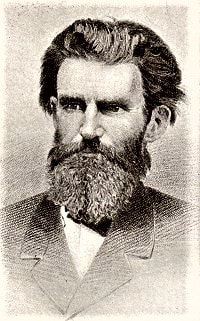 William B. Bradbury (Ref. 6) William B. Bradbury (Ref. 6) Hymn Tune Composer William Batchelder Bradbury (1816-1868) was an American musician who composed the tune in 1859 most often associated with "Savior, Like a Shepherd Lead Us" (Ref. 3, Ref. 5 below, Ref. 6). He named the tune "Bradbury" after himself (Ref. 3, Ref. 5). Mr. Bradbury "modified the original words meant for children and broadened the meaning to include all the congregation" (Ref. 3). Mr. Bradbury also composed the tunes to many popular hymns including "Jesus Loves Me," "He Leadeth Me," and "My Hope is Built" (Ref. 6). In addition to being an excellent musician and composer, Mr. Bradbury served as a music educator, choir leader, organist, and was a devoted reader of the Bible (Ref. 7, Ref. 8). All of the Bible verses below are linked to the BibleGateway.com website (Ref. 9). The verses below are quoted from the English Standard Version (ESV) unless noted otherwise. To see the lyric sheet for all four verses of "Savior, Like a Shepherd Lead Us" on one page, click here. The lyrics are provided by Timeless Truths (Ref. 10). Scripture Allusions - Verse 1 The first verse of this great hymn teaches children that Christ is our great Shepherd who leads us, cares for us, feeds us, and protects us. The verse also explains that Christ has redeemed us and that we are his possession. "Savior, like a shepherd lead us, much we need Thy tender care" The Lord is our Shepherd who leads us and cares for us. Psalm 23:1-3 -- "The Lord is my shepherd; I shall not want. (2) He makes me lie down in green pastures. He leads me beside still waters. (3) He restores my soul. He leads me in paths of righteousness for his name's sake." Psalm 23:5 -- "You prepare a table before me in the presence of my enemies; you anoint my head with oil; my cup overflows." Isaiah 40:11 (KJV) -- "He shall feed his flock like a shepherd: he shall gather the lambs with his arm, and carry them in his bosom, and shall gently lead those that are with young." John 10:11 -- "I am the good shepherd." (also John 10:14) "In Thy pleasant pastures feed us, for our use Thy folds prepare." The Lord feeds us in pleasant pastures and protects us. Ezekiel 34:14 (KJV) -- "I will feed them in a good pasture, and upon the high mountains of Israel shall their fold be: there shall they lie in a good fold, and in a fat pasture shall they feed upon the mountains of Israel." 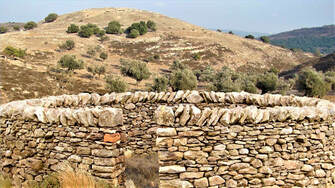 Permanent Sheepfold Enclosure - Holy Land. Photo Copyright David Padfield. Used under license. Photo source: FreeBibleImages.org. Permanent Sheepfold Enclosure - Holy Land. Photo Copyright David Padfield. Used under license. Photo source: FreeBibleImages.org. A fold was a walled in, hedged, or fenced place for keeping and protecting sheep or other livestock (Ref. 11, Numbers 32:24 KJV). Jesus referred to such a sheepfold in John 10:1 (KJV). "Truly, truly, I say to you, he who does not enter the sheepfold by the door but climbs in by another way, that man is a thief and a robber." Jesus not only is the means of access to the fold; he also is the Shepherd who protects the sheep in the fold with his own body at the door. "I am the door. If anyone enters by me, he will be saved and will go in and out and find pasture" (John 10:9, Ref. 12). "Blessed Jesus, blessed Jesus! Thou hast bought us, Thine we are." (Phrase repeated) The phrase, "Thou hast bought us, Thine we are," explains to children the meaning of redemption. HELPS Word-studies defines redeem as "to release (set free) by paying the full ransom"; (figuratively) to restore "something back, into the possession of its rightful owner" (Ref. 13). Christ has purchased us and now we are his possession. Titus 2:13-14 (italics added) -- " ... waiting for our blessed hope, the appearing of the glory of our great God and Savior Jesus Christ, who gave himself for us to redeem us from all lawlessness and to purify for himself a people for his own possession who are zealous for good works." 1 Peter 1:18-19 (KJV) -- "Forasmuch as ye know that ye were not redeemed with corruptible things, as silver and gold, from your vain conversation received by tradition from your fathers; But with the precious blood of Christ, as of a lamb without blemish and without spot." Listen and Sing Along Click on this YouTube link - Solo piano meditation on the hymn "Savior, like a Shepherd Lead Us" with sing-along lyrics. Recorded by Rick Betts - March, 2011. Prayer Thank you, Jesus, for being my Savior and Shepherd. Thank you for leading me and for all the ways that you care for me. References
1. http://diglib.library.vanderbilt.edu/act-imagelink.pl?RC=48288 2. http://www.scriptureway.com/home/savior-like-a-shepherd-lead-us-scripture-allusions-verse-2 3. https://www.umcdiscipleship.org/resources/history-of-hymns-savior-like-a-shepherd-lead-us 4. https://en.wikipedia.org/wiki/Dorothy_Ann_Thrupp 5. The United Methodist Hymnal, The United Methodist Publishing House, 1989 6. https://en.wikipedia.org/wiki/William_Batchelder_Bradbury 7. https://www.wholesomewords.org/biography/bbradbury.html 8. http://www.hymntime.com/tch/bio/b/r/a/d/bradbury_wb.htm 9. https://www.biblegateway.com/ 10. Reference 10 begins next line https://library.timelesstruths.org/music/Savior_Like_a_Shepherd_Lead_Us/ 11. https://www.biblegateway.com/resources/encyclopedia-of-the-bible/Fold 12. http://www.ScriptureWay.com/home/jesus-is-the-door 13. https://biblehub.com/greek/3084.htm
Photo source: FreeBibleImages.org
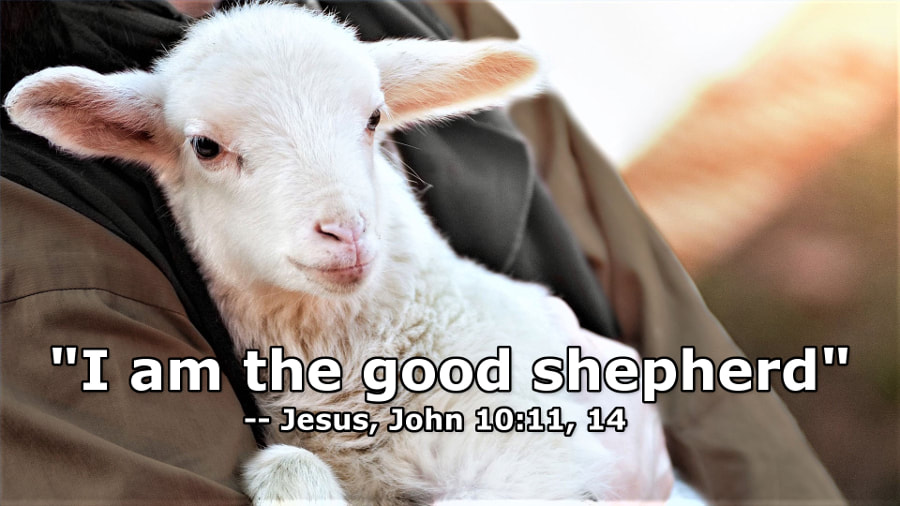
The Good Shepherd. Photo Copyright David Padfield. Used under license. Jesus said, “I am the good shepherd” (John 10:11, 14). Jesus told a parable about a good shepherd who went searching for one of his sheep that was lost (Luke 15:1-7). Jesus said, “For the Son of Man has come to seek and to save that which was lost” (Luke 19:10).
"Our Lord not only declares that He is the reality of which the earthly shepherd is the shadow, and that He as the flawless, perfect One, but that He alone is the reality. 'I am the Good Shepherd; in Me and in Me alone is that which men need.' " -- Alexander MacLaren (1826-1910) (Ref. 1, Ref. 2)
This lesson is the fourth in a series on the "I AM" statements of Christ. This lesson discusses Jesus' statements, "I am the good shepherd," in John 10:11 and John 10:14.
Consider. Are you like a lost sheep? Have you gone astray (Isaiah 53:6)? Are you living outside of the sheepfold? Jesus Christ is the Good Shepherd, the one who loves us, seeks us, saves us, and protects us. He is the one who laid down his life for his sheep. He is the one who knows us.
God is Our Shepherd (Old Testament Perspective)
The Old Testament describes God as the shepherd for his people. God is the one who cares for the total well-being of his sheep. David wrote, "The Lord is my shepherd, I shall not want. He makes me lie down in green pastures; He leads me beside quiet waters. He restores my soul; He guides me in the paths of righteousness For His name’s sake" (Psalm 23:1-3).
In a perhaps less widely-known passage, Ezekiel also described the characteristics of the Lord God as the shepherd of Israel (Ezekiel 34:11-16):
Hundreds of years before Jesus came, Isaiah spoke of Jesus. "He shall feed his flock like a shepherd: he shall gather the lambs with his arm, and carry them in his bosom, and shall gently lead those that are with young" (Isaiah 40:11). "I Am the Good Shepherd"
The Greek word for good means beautiful, as an outward sign of inward good, noble, honorable character (Ref. 3). Think of the greatness and the immensity of the claim that Jesus makes upon our faith in John 10:11 and John 10:14. Jesus claims to be the divine shepherd witnessed to and described by the psalmist and the prophets.
Jesus states that in him alone is everything that we need - sustenance, protection, care, restoration, direction, and eternal life (Luke 15:4, Luke 19:10, Psalm 23:1-3, John 10:3-4, John 10:9, John 10:27-28, Ref. 1). The Greek text in John 10:11 and John 10:14 uses the definite article "the" before "good shepherd" (Ref. 4, Ref. 5). "The definite article claims this ['I am the good shepherd'] as a description applicable to Himself alone" (Expositor's Greek Testament - Ref. 6, brackets added). "The Good Shepherd Lays Down His Life for the Sheep"
Jesus states two features by which he as the good shepherd would be known. The first feature is his giving his life for the sheep (John 10:11, Ref. 6). Recall the personal risk of life that David faced because he was a shepherd. David himself rescued the lamb of his father's flock from the mouth of the lion and the bear (1 Samuel 17:34-36, Ref. 7). "That self-sacrifice that would lead the shepherd to risk his own life for that of the flock has its ideal fulfillment in Him who is the Good Shepherd, and will give His life for mankind" (Ref. 7).
"The death of the Shepherd is the security of the sheep; and I say to you, the flock, that for every soul the entrance into the flock of God is through the door of the dying Christ, who laid down His life for the sheep, and makes them His sheep who trust in Him" (Ref. 1, Ref. 8). "I Know My Own and My Own Know Me"
Jesus stated a second feature by which he would be known as the good shepherd. That feature is the reciprocal knowledge of the sheep and the shepherd (John 10:14, Ref. 6). The Greek word for know in John 10:14 is ginóskó, which means to know, especially through personal experience (Ref. 9). However, the language for know in John 10:14 describes more than a dictionary lookup alone conveys. Jesus describes closest communion between himself as the good shepherd and his sheep (Ref. 7). Jesus describes the relationship as loving regard, affection, and recognition between the shepherd and his sheep (Ref. 1). He knows us because he loves us. As his sheep, we know him as our shepherd, and we love him and trust him. We know his voice and we follow him (John 10:4, John 10:27-28).
Apply. Jesus loves you and already knows you. Jesus wants to have a close reciprocal relationship with you. Are you loving him, trusting him, and following him today?
References
1. https://biblehub.com/commentaries/maclaren/john/10.htm 2. https://en.wikipedia.org/wiki/Alexander_Maclaren 3. https://biblehub.com/greek/2570.htm 4. https://biblehub.com/interlinear/john/10-11.htm 5. https://biblehub.com/greek/3588.htm 6. https://biblehub.com/commentaries/egt/john/10.htm 7. https://biblehub.com/commentaries/ellicott/john/10.htm 8. http://www.ScriptureWay.com/home/jesus-is-the-door 9. https://biblehub.com/greek/1097.htm
Photo source: FreeBibleImages.org
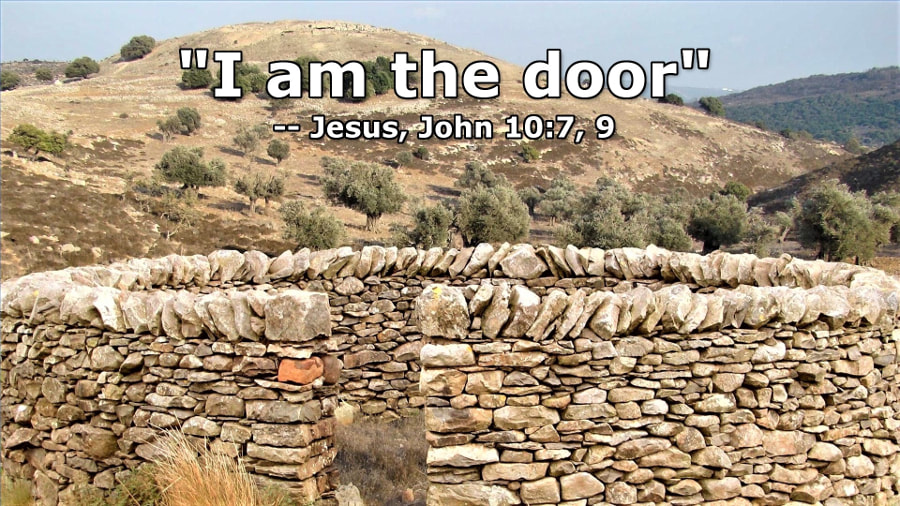
Permanent Sheepfold Enclosure - Holy Land. Photo Copyright David Padfield. Used under license. Permanent sheepfolds were built on the sunny side of valleys where there is protection from cold winds. These had stone walls, 4-5ft high and one entrance guarded by the shepherd. Thorns were often put on the top of walls to deter wild animals. Jesus referred to such a sheepfold and to thieves and robbers climbing over the wall (John 10:1-3).
"So Jesus said to them again, 'Truly, truly, I say to you, I am the door of the sheep.' " (John 10:7, Ref. 1)
"I am the door; if anyone enters through Me, he will be saved, and will go in and out and find pasture." (John 10:9)
"Christ is the Door. And what greater security has the church of God than that the Lord Jesus is between it and all its enemies? ... Here are plain directions how to come into the fold; we must come in by Jesus Christ as the Door." -- Matthew Henry (Ref. 2)
This lesson is the third in a series on the "I AM" statements of Christ. This lesson discusses Jesus' "I am the door" statements in John 10:7 and John 10:9.
Consider. Have you entered into the church of God by believing in the Lord Jesus Christ? Are you experiencing spiritual nourishment in Christ? "If anyone enters through Me" - John 10:9
We enter the sheepfold, the church of God, through Jesus Christ (and only through Jesus Christ). Jesus said, "Truly, truly, I say to you, I am the door of the sheep" (John 10:7). We enter that door when we place our faith and trust in Jesus Christ. "As the only proper way of entering the fold was by the door, so the only way of entering the church of God is by believing on him and obeying his commandments" (Ref. 3).
Jesus said, "I am the way, and the truth, and the life; no one comes to the Father but through Me" (John 14:6). "He will be saved"
Once we have entered the door by faith and trust in Jesus Christ, we are saved. Jesus delivers us from perils such as ravenous wolves and false shepherds (Ref. 4, John 10:1-2). Jesus frees us from the power, guilt, and penalty of sin (Romans 8:1-2, Ephesians 2:1-9). Jesus gives us eternal security. Jesus said, "My sheep hear My voice, and I know them, and they follow Me; and I give eternal life to them, and they will never perish; and no one will snatch them out of My hand" (John 10:27-28).
HELPS Word-Studies defines saved as rescued from destruction and brought into divine safety (Ref. 5). "And will go in and out and find pasture"
To go "in and out" is the common Old Testament expression to denote free activity of daily life (Ref. 6). When Moses charged the Israelites at Mount Gerizim to obey the Lord, he said, "Blessed shall you be when you come in, and blessed shall you be when you go out" (Deuteronomy 28:6, Deuteronomy 27:11-12, Deuteronomy 28:1-2). David wrote about the Lord, the Keeper of Israel (Psalm 121:5). David said, "The Lord will guard your going out and your coming in from this time forth and forever" (Psalm 121:8).
Through Jesus (because he is the door), we have security for our daily needs and nourishment for our souls. Under the care of Jesus, we find pasture - food for our souls (Ref. 7). David wrote, "The Lord is my shepherd; I shall not want. He maketh me to lie down in green pastures: he leadeth me beside the still waters" (Psalm 23:1-2 KJV).
Apply. Have you entered the sheepfold of Christ by believing in him? If not, then put your faith and trust in him today. Are you spending time with Jesus daily to receive spiritual nourishment? How can you improve in this area?
References
1. http://www.ScriptureWay.com/home/when-jesus-said-truly-truly-what-did-he-mean 2. https://biblehub.com/commentaries/mhc/john/10.htm 3. https://biblehub.com/commentaries/barnes/john/10.htm 4. https://biblehub.com/commentaries/pulpit/john/10.htm 5. https://biblehub.com/greek/4982.htm 6. https://biblehub.com/commentaries/egt/john/10.htm 7. https://biblehub.com/commentaries/benson/john/10.htm |
Daily Bible Verse(Click the link above) AuthorMr. Whitney V. Myers. Christian. For more information, please visit the Author Page. Posting ScheduleI plan to provide new postings about once a month. Planned Topics(subject to change) Recent Posts(most recent three months) Popular Posts(top 10) Categories
All
Archives
July 2024
|
|
Copyright 2018-2024 Whitney V. Myers |
Listed in Feedspot's Top 100 Bible Study Blogs and Websites |

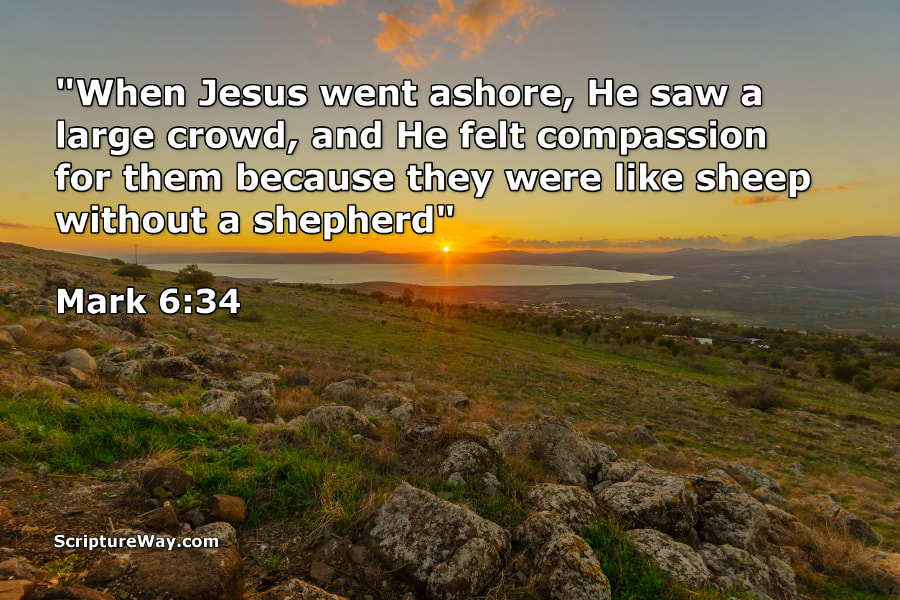
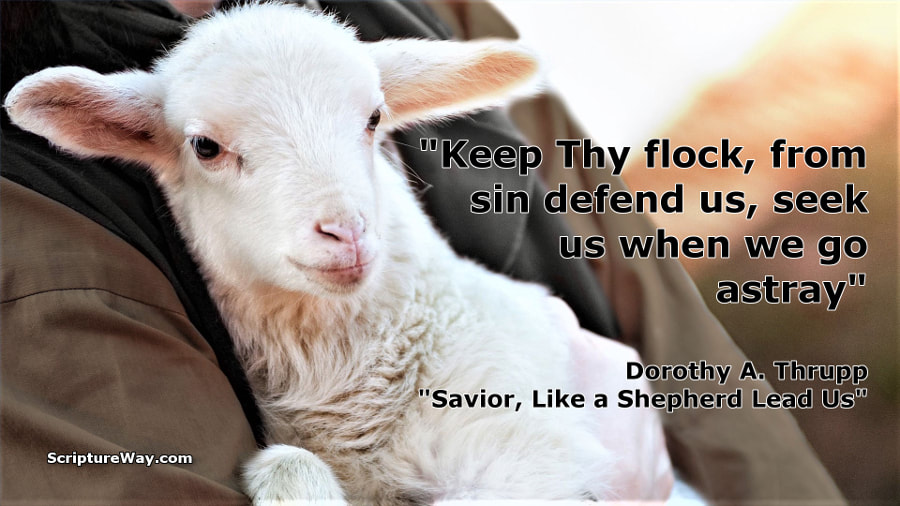

 RSS Feed
RSS Feed
